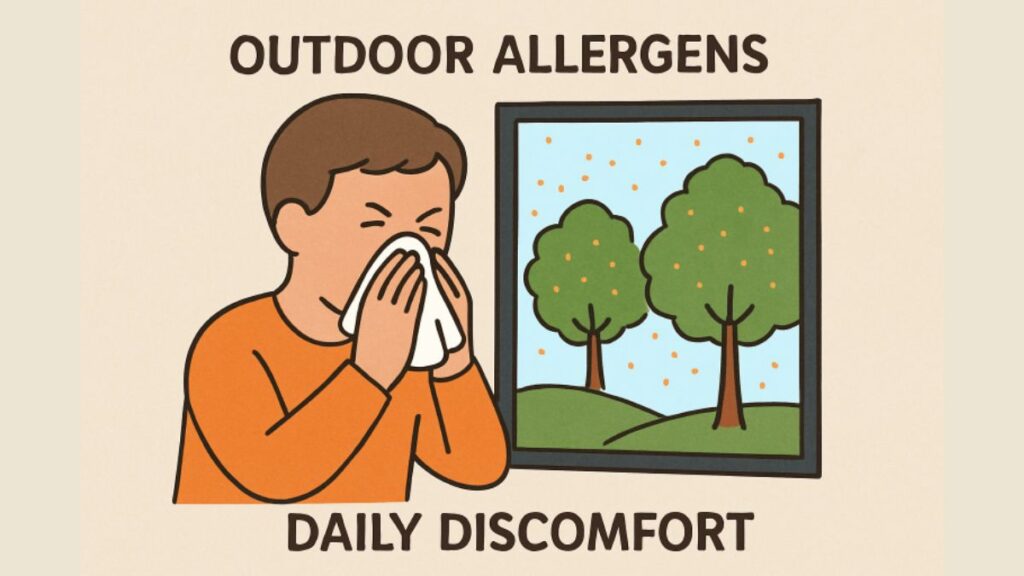The Pervasive Impact of Seasonal Allergies
Seasonal allergies, also known as hay fever or allergic rhinitis, are a widespread health issue affecting millions of Americans annually. Symptoms include sneezing, a runny nose, and itchy eyes, but they can also drain energy, cause concentration issues, and lead to exhaustion. Physical effects include headaches and nasal congestion, while emotional fatigue and irritability can result from lost sleep and disrupted routines. Over time, this can impair performance at work and school, leading to missed deadlines, reduced productivity, and more days off than many chronic illnesses. The burden extends to daily activities, such as outdoor pursuits, as discomfort can prompt individuals to stay indoors or reduce their physical activity. The struggle often continues indoors as pollen lingers and accumulates on clothing, pets, and in-home ventilation systems. Repeated exposure can also amplify the body’s natural response, resulting in lingering symptoms that persist throughout the night and disrupt much-needed rest. Those who feel overwhelmed by constant allergy attacks may benefit immensely from the expertise of a trusted allergy doctor in Frisco, TX who can offer targeted strategies for lasting relief, personalized medications, and holistic lifestyle recommendations designed to restore well-being.
Uncommon Allergy Symptoms to Watch For
Seasonal allergies can cause a range of symptoms, including persistent post-nasal drip, ear congestion, and irritability. These symptoms can cause sleep disturbances, difficulty speaking, and even impact balance. In dry or air-conditioned environments, constant nose-blowing can trigger spontaneous nosebleeds, indicating irritated nasal passages. Children and adults may also experience irritability, increased daytime tiredness, or mild headaches. These atypical symptoms can be mistaken for illnesses like colds, sinus infections, or viral infections, potentially delaying effective allergy treatment. Recognizing these warning signs early and discussing them with a qualified allergy specialist or general practitioner is crucial. Proper diagnosis and prompt intervention can prevent the escalation of issues to more serious conditions, such as chronic sinusitis, ear infections, or long-term disruptions to sleep and daily routines.
Climate Change and Prolonged Allergy Seasons
Climate change is causing a significant shift in the environmental landscape for allergy sufferers, with a surge in pollen counts and extended peak allergy periods. Warmer global temperatures, higher carbon dioxide concentrations, and increased plant growth, particularly among allergy-inducing varieties like ragweed and certain grasses, are linked to this. This accelerated pollen production exacerbates seasonal allergies and prolongs the duration of symptoms for individuals. The repercussions are far-reaching, increasing the potential for chronic respiratory symptoms, aggravating underlying conditions like asthma, and increasing fatigue and distress caused by allergic reactions. Public health officials are concerned about rising healthcare costs, reduced workforce productivity, and increased demand for medical intervention. Longer allergy seasons can take a heavy emotional toll, making preventative and responsive care more important than ever.
Managing Allergies in Daily Life
Effective allergy management involves proactive habits, careful planning, and tailoring solutions to individual needs. Vigilance is crucial, including checking pollen forecasts, limiting outdoor activities during peak allergen levels, using HEPA-filter air purifiers at home, and showering and changing clothes after outdoor activities to prevent indoor pollen exposure. This approach helps reduce indoor pollen concentrations and protects skin, clothing, and hair from pollen exposure.
- Monitor Pollen Levels: Use reputable sources to track daily and weekly trends, which helps you make informed decisions on when to plan outdoor events or activities. Even quick outdoor chores can trigger symptom flares on high-pollen days.
- Limit Exposure: Establish routines such as removing shoes at the door, laundering outdoor clothing frequently, and cleaning floors and surfaces with a damp cloth to remove accumulated pollen and dust.
- Medications: Over-the-counter remedies, such as antihistamines, decongestants, and steroid nasal sprays, offer rapid symptom relief for many but are most effective when taken before symptoms peak. For those struggling with more persistent or intolerable symptoms, healthcare professionals may recommend prescription medications or long-acting allergy shots (immunotherapy) for long-term relief.
- Healthy Lifestyle: Supporting your immune system with adequate hydration, nutritious meals, regular physical activity, and restorative sleep can slightly bolster resilience against allergies, reduce inflammation, and accelerate recovery.
- Personalized Planning: Collaborating with your doctor or allergist allows you to develop a customized allergy prevention and treatment strategy tailored to your lifestyle and specific triggers.






